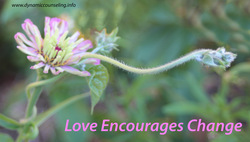 Each new year brings new energy and desire for change! Often when we have something we want to change in ourselves, the first response we have is anger, frustration, rejection. We then try to go about our desired change with a hammer over our heads! How many of us do well while getting bossed around, criticized and rejected? It might work for a little while—or a long while, if we are super-tolerant—but after a time, we stop trying so hard, or try to get away from the hammer, thus avoiding the task at hand. We do better at change when we have encouragement, acceptance and a caring eye guiding us in the new behavior. Who is the best person to do that for you? Maybe you have a supportive friend, or an encouraging therapist. But you are with you all the time! You are the one who will walk with you through all of the ups and downs of life! Here are a few ways to encourage yourself through any change you want to make:
A little love goes a long way to melt raw materials and create a masterpiece. Take a best friend with you into 2014…YOU! Happy New Year, and happy new YOU! 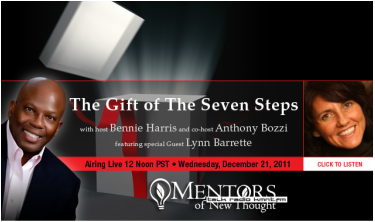 Two years ago, I had the privilege of participating in a three part web radio series on Jane Elizabeth Hart's powerful processing tool, Seven Steps for Successful Life Transitions, with Jane Elizabeth and my awesome husband, Gregory Barrette. Since it is a time of transitioning from one year into the next, I wanted to re-post these audios on the Seven Steps. Releasing the old year is an essential part of making room for a new year of experiences and spiritual growth! The first interview in the series, called "How to Move into the New Year Empowered", was with author and spiritual teacher Jane Elizabeth. Click here to listen. For more information on her formula for moving through changes, Seven Steps for Successful Life Transitions, and empowering yourself for the new year, click here. While you are there, check out the free spiritual resources available at Center For Enlightenment. "Every problem in life is here to support your soul's evolution. Unless you have a challenge, you will never know your capabilities. Your problems are not awful. They are the most wonderful tools designed to push you forward!" ~Jane Elizabeth My interview was next: "The Gift of the Seven Steps." Listen to the recorded show here: Mentors of New Thought Radio. Below is the description of the program: "My work with clients is to help pull out the patterns and help make the unconscious conscious," says therapist and spiritual counselor Lynn Barrette, LCSW. "Or, as leading psychiatrist Dr. Dan Siegel says in his book, Mindsight, “In order for us to become aware of the feelings inside us—to consciously attend to and understand them—we need to link these subcortically created emotional states to our [higher thinking] cortex.” Or, in spiritual terms, making the unconscious conscious! In order for us to heal the buried emotions and the beliefs that are sustaining them, we need to become aware of our hidden patterns that keep us stuck. "Jane Elizabeth's Seven Steps for Successful Life Transitions is the greatest, most thorough processing tool I have found to uncover and heal unconscious patterns, for myself as well as my clients." The final show in the series was with Gregory Barrette. Greg spoke about leaving the old year behind and "Making a New Start" in the new year. Here's what he says about this powerful tool: "The Seven Steps method is the single most effective way I know to forgive and release old, past issues and experiences... to fully let go of all that has happened in the past year and open up to a new experience in 201." Listen to to Greg's interview here. However you use the Seven Steps process, it will help catapult you into new spiritual understanding in many different situations in life. Try it out, and let me know how it works for you!  No, I’m not talking about soccer. Or rugby. Or quidditch. I’m talking about those goals you made last month for the new year. How are they going for you? Committing to a goal is exciting. It brings with it new energy, new hope for happiness, and…change. Uh-oh. There it is. Change. Our commitments require us to change. If they didn’t, we wouldn’t need to commit to something in the first place, would we? We often secretly expect new year magic to come in and make us different so we can have the outcomes of our new year’s goals…which come from the awareness that we need to change. See? Tricky! Let’s look more closely at what our resolutions really require us to do. Run one of your goals through the following questions to see what you are really committing to: 1. What is my goal? (Keep it simple, realistic and attainable.) 2. What would keep me from achieving this goal? 3. What do I have to give up in order to make this goal happen? 4. What do I have to begin doing in order to make this goal happen? 5. What would support me in achieving this goal? 6. How can I break this goal down into manageable steps? 7. What is a good first step toward this goal? Knowing what we are in for when committing to anything helps us know how to be prepared and advocate for our success. You are an evolving soul that embraces change. Cooperate with that metamorphosis! 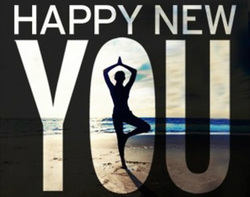 REVAMPED RULES FOR RESOLUTIONS So we made it to 2013 after all! Maybe you put off your New Year’s resolutions until now so let’s take this time to look at a few rules for your New Year resolutions. First take out any resolution that begins with "I want a better …" We all want to enjoy where we are no matter what, and if we don't like something, we think we have to jump to something else. So many desires building on each other keep us from listening within to what our soul is trying to tell us. Perhaps we are supposed to stay and learn something from our current job, relationship, house, car, and so forth. How will we know what we are truly supposed to do when we are somewhere already making our exit plan? Try the good ole standby Serenity Prayer instead: "God, grant me the serenity to accept the things I cannot change, the courage to change the things I can, and the wisdom to know the difference." Now that is a beautiful resolution for 2013! Next, add meditation to your daily self-care routine. Are you tired of hearing about the importance of meditation? Increasingly, meditation is shown to reduce stress, physical and mental illnesses, and even increase successful decision-making in daily life. Commit to making the centeredness of your soul as important as the care of your physical body! Ten minutes a day will change you at depth. Now commit to learning to observe yourself. Hold one part of yourself in a listening and watching position within you, while the other part of you is in "doing" mode. You will be amazed at what you learn about yourself and how much easier it is to make changes when you discover something you don’t like so well about your own motives. This helps us to be more in tune with our intuition as well, and who doesn’t want that for their new year? Finally, resolve to forgive – any time, anywhere, for any reason. Do it just once, and you will discover how much lighter you feel, how much happier you can be! It’s worth the regular maintenance, but even if you forgive two out of three times, you’ll be lighter when the time comes to release this year and prepare for 2014. Service to others adds a nice extra credit touch to your list of resolutions. It allows you to share all the good vibes that lift you when you do all of the above actions. There is nothing more fulfilling than supporting our own soul. Then we have much, much more to give to others. For 2013, resolve to evolve! 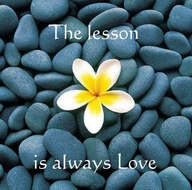 Jane Elizabeth Hart, author of Spiritual Power Tools, would often say in her classes, “Love is the answer. What is the question?” She was reminding us that every day provides opportunities to love—and not just the easy ones. As her students, we would ask her, “What do I do about this person? What do I need to do to forgive and release them from my life?” At times, underneath such questions was the ulterior motive of either making the person change or wanting them out of our lives altogether! Jane Elizabeth would respond with the bottom line answer: Love. This was our direction: That no matter how much processing, forgiving and releasing we do, our action step is still the same: to love unconditionally, without judgment or hesitation. Her question became a tool in the midst of difficult interactions. We could ask our selves, “If I were coming from love, how would I act?” At Christmastime, there is an energy of love which opens our hearts to giving and receiving love. Let your Christmas intention be to share love freely, especially with those more difficult characters in your Christmas story. Love is the answer. What was the question? The holiday season is upon us, and for all the joy the holiday brings, for some of us it is the time when we gather with people we probably shouldn’t be around. Alas, blood is sometimes thicker than one’s mental health.
Most likely, you know your family members pretty well. You know who is going to get drunk and embarrassing, who will get nasty, who will be emotional and demanding, and who will be enjoyable to be around. Chances are, they haven’t changed all that much since last year! So, why not proactively enter the holidays with an attitude of forgiveness and resiliency? We are here to evolve into more conscious, responsible individuals. Often, mental health issues arise when we resist what is happening around us and our equilibrium gets out of whack. It is restored as we embrace and adjust to life situations, knowing when to be accepting of others’ less-evolved personalities, and when to get the heck out of their way. A difficult discipline, and a soul-strengthening one! Having a new experience of the holiday season requires us to examine past decisions and expectations, learn from them, and move on. Uncle Delbert the Drunk will not likely have changed, unless he has successfully gone through treatment. Bringing our old ways of thinking into a situation where we want change can lead to depression: Not clearing the air of our own inefficient and undesirable beliefs and patterns, but expecting new results! A powerful forgiveness and resilience tool is Jane Elizabeth Hart’s Seven Steps for Successful Life Transitions. Hart created this method for releasing old patterns, beliefs and other life situations, based on her personal experiences of change, loss and spiritual growth. Each of the Seven Steps deals with an aspect of the situation at hand. For holidays, she suggests working with the family system as a whole (rather than each person individually) through each step. Journaling is suggested, tissues should be on hand, and laughter at some point is a must. (See the journaling questions on the table next to the Fellowship door, or visit http://www.cfenlightenment.org.) Step one is 'Gratitude and Acceptance’ and deals with all that we are grateful for in regards to our family gatherings and members thereof. Write down all the aspects of these events that you are grateful for. What joy have these situations brought to you? Don’t worry if you can’t think of anything; simply return to it when you can. Step two looks at the ‘Good Times.’ Think of specific situations in the past that have been enjoyable for you at these family gatherings. There might be something that keeps bringing you back for more. Again, skip it if you need to. Step three allows us to look at our ‘Hopes and Dreams.’ What do you hope will happen? What have you dreamt that these gatherings would be like? Who do you hope you don’t have to see when you’re there? Who do you hope will behave differently? Who have you wanted to get to know, but never have approached? Get those thoughts from swimming around in your head, creating unnecessary stress! It doesn’t mean that these hopes and wishes will necessarily come true; this is to help you let them go. Step four deals with those ‘Disappointments and Difficulties.’ Ah, yes, the confrontations, the embarrassments, the arguments, the losses—everything. Can you see why you have dreaded these events? Can you see any unresolved issues within yourself that are surfacing to be healed? The most important step is the fifth step: ‘Forgiveness.’ This is how we heal. Who or what circumstance is the hardest to forgive? Why? What does it mean for you if you don’t forgive? What does it mean for you if you do? If we can find it in ourselves to forgive obnoxious behavior, we can handle it much better when it greets us with a wet kiss. We are not condoning unacceptable behavior—dealing with that is a whole other article—I’m talking about the annoying and the petty. Forgiveness requires a certain leap of faith—whatever ours may be—into a space of allowing another to be what they choose to be without it throwing us off-center. Forgiveness pulls us out of the mindset that someone can ruin our day by not meeting our expectations, and puts us into a space of compassion and non-resistance toward less-conscious behavior in others (and ourselves!). It’s tough, but if we are willing, it could just save our holiday. Finally, we ‘Release’ all these in the sixth step, and affirm our ‘Completion’ with the process in step seven. I like having a ritual for my completion process, sometimes burning my journaling notes, or using Hart’s Seven Step meditation. The most important relationship is the one we have with ourselves; and when we are okay with ourselves, we can be open to better possibilities. If you get stuck on a situation that has happened in your family, be sure to seek professional help. No matter what has happened in the past, every new year—every day!—opens new doors for us. Our job is to prepare our minds and hearts for those opportunities to come forth, not so Delbert the Drunk will change, but so we can. Happy holidays! |
Archives
April 2016
AuthorLynn Barrette, LCSW Blending psychology with spirituality, I offer tools for forgiveness, acceptance, meditation and relaxation, and positive parenting solutions. Categories
All
Archives
April 2016
|
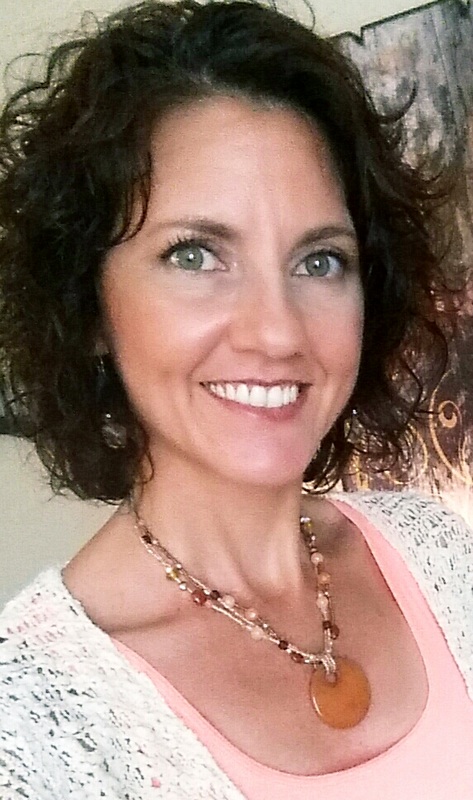

 RSS Feed
RSS Feed